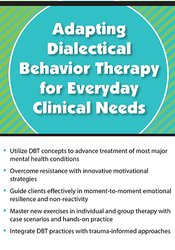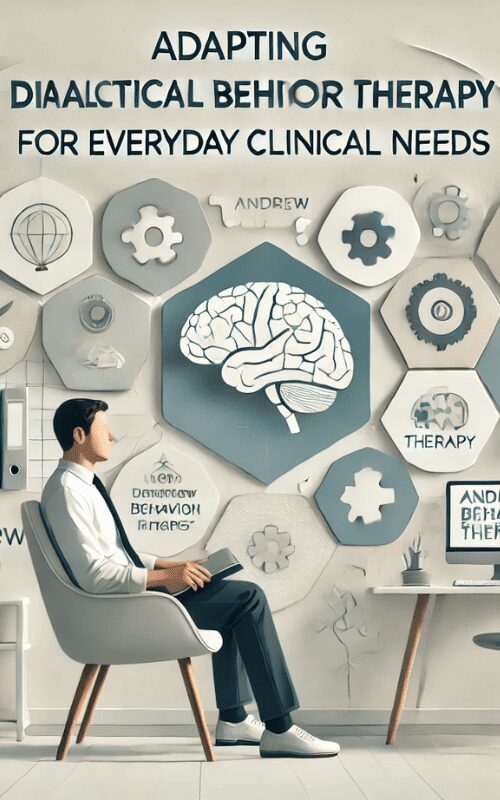Adapting Dialectical Behavior Therapy for Everyday Clinical Needs – Andrew Bein
Adapting Dialectical Behavior Therapy for Everyday Clinical Needs – Andrew Bein has the same quality as the author’s salapage.
Overview
Salepage check: Adapting Dialectical Behavior Therapy for Everyday Clinical Needs
Author: Andrew Bein
- Faculty:
- Andrew Bein
- Duration:
- 6 Hours 13 Minutes
- Format:
- Audio and Video
- Copyright:
- Sep 20, 2018
Description
The Game-Changing Guide to Integrating DBT in Your Practice
For clients who struggle to regulate and cope with their emotions, Dialectical Behavior Therapy (DBT) can bring about lasting behavioral change – even if they aren’t diagnosed with Borderline Personality Disorder. Learn to adapt DBT to meet the needs of your practice and advance your clients’ treatment goals across a wide spectrum of behavioral health conditions. This recording will teach you to direct growth in each of the DBT skill areas (emotion regulation, mindfulness, interpersonal effectiveness, and distress tolerance) and guide efforts in moment-to-moment resilience and non-reactivity.
Led by Dr. Andrew Bein, a seasoned instructor with an energetic, hands-on approach to education, you will quickly master strategies for enhancing motivation and strengthening client engagement, as well as explaining the theory and science of DBT accessibly to clients. By the end of the recording, you will have the tools necessary to integrate DBT immediately into your practice and help your clients finally take control of their emotions and their lives.
Handouts
| Manual – Adapting Dialectical Behavior Therapy (4.72 MB) | 72 Pages | Available after Purchase |
Outline
Dialectical Behavior Therapy
- Dialectics
- DBT vs. CBT
- DBT in individual therapy
- DBT in group therapy
- Hierarchical skill instruction
- Supporting research
- Limitations of practice and risk
The Four Modules Of DBT Skills
- Mindfulness
- Distress tolerance
- Emotion regulation
- Interpersonal effectiveness
Foundations For Powerful Client Interventions
- Describe DBT principles and neuroscience accessibly to clients
- Unify concepts
- Build upon and refine concepts and skills session-to-session
- Flatten the clinician-client hierarchy
- Connect with client trauma
- Enhance internal motivation
- Strengthen skillful response and personal resilience
The Client’s Wise Mind Process
- Intention
- Acceptance and culturally competent equivalents
- Improve the moment for emotion regulation and safety
- Expand the moment to strengthen connection
- Cultivate self-compassion, an emotion regulation oasis
- Use Wise Mind diagrams for clients
Key Client Exercises
- Effectively teaching mindfulness exercises
- Face emotions and thoughts, improving the moment
- Deal with judgments
- Deal with difficult times: distress tolerance plan
- Expand the moment (inclusive “bigger picture” or spiritual strategies)
- Work with client logs and assignments
Moving Beyond Theory: How To Integrate Principles In Your Practice
- Applications for diverse clientele
- Adapt DBT to your practice setting
- Strategies for effectively incorporating DBT
- DBT work side-by-side with other interventions
- Maintain practitioner radical acceptance and mindfulness in the midst of emotional intensity
- Discuss case scenarios
Please Note: PESI is not affiliated or associated with Marsha M. Linehan, PhD, ABPP, or her organizations.
Faculty
Andrew Bein, PhD, LCSW Related seminars and products: 1
Andrew Bein, Ph.D., LCSW, has, for 20 years, been implementing mindfulness-based practices and Dialectical Behavior Therapy at a variety of practice settings. In a manner responsive to clinician, client and contextual realities, he has launched and contributed to DBT integration at the following settings: community mental health, outpatient dual diagnosis, women’s substance abuse, crisis residential, and high school and he has incorporated DBT into his private practice for individual and group treatment.
In addition to being a nationwide speaker, Dr. Bein is Professor Emeritus at Sacramento State University. His seminars blend evidence-based and practical-based guidance with compassion, humor and clarity, reflecting his deep commitment to directly modeling positive clinician practice. His latest book, Dialectical Behavior Therapy for Wellness and Recovery: Interventions and Activities for Diverse Client Needs, illustrates how DBT can be integrated into clinical practice for profound client change.
Speaker Disclosures:
Financial: Andrew Bein has an employment relationship with Sunburst Project. He is an author for John Wiley and Sons and receives royalties. Dr. Bein receives a speaking honorarium from PESI, Inc.
Non-financial: Andrew Bein has no relevant non-financial relationship to disclose.
Curriculum
FAQs
Requirements
- A foundational understanding of Dialectical Behavior Therapy (DBT) principles.
- Prior experience in clinical or counseling psychology is recommended.
- Access to a digital device (laptop, tablet, or smartphone) for streaming course materials.
- Motivation to adapt DBT techniques to various therapeutic scenarios.
Features
- In-Depth DBT Adaptation Techniques: Learn to customize DBT tools for diverse therapeutic needs, from anxiety to trauma recovery.
- Real-World Clinical Insights: Gain practical advice from Andrew Bein’s extensive clinical experience.
- Hands-On Strategies: Access worksheets, examples, and actionable tools for immediate application.
- Flexible Learning: Online format allows learners to engage with the course material anytime, anywhere.
- Cost Efficiency: Save up to 80% compared to the original SalePage price when purchased on courses.ceo.
Target audiences
- Licensed mental health professionals, including psychologists, social workers, and counselors.
- Therapists seeking practical approaches to applying DBT in diverse clinical settings.
- Clinicians managing clients with emotional dysregulation or behavioral challenges.
- Students and trainees in psychotherapy or mental health fields looking to enhance their skill sets.


